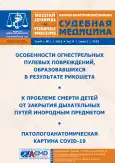Problems of organizing the work of pathological and anatomical bureau (devices), forensic medical examination bureau in the conditions of COVID-19
- Authors: Bogovskaya E.A.1,2, Aleksandrova O.Y.3, Boroday A.4, Zabozlajev F.G.5
-
Affiliations:
- Moscow Regional Research and Clinical Institute
- Russian Medical Academy of Continuous Professional Education
- N.A. Semashko National Research Institute of Public Health
- Universidad Europea de Madrid
- Federal Research and Clinical Center of Specialized Medical Care and Medical Technologies FMBA of Russia
- Issue: Vol 8, No 1 (2022)
- Pages: 31-40
- Section: Reviews
- URL: https://journal-vniispk.ru/2411-8729/article/view/122445
- DOI: https://doi.org/10.17816/fm398
- ID: 122445
Cite item
Full Text
Abstract
The work of medical professionals is always associated with a risk to life, but during the onset of the COVID-19 pandemic, forensic experts and pathologists were faced with the need to diagnose a new and highly contagious disease in the presence of inadequate specific methodological guidelines.
Optimization of work organization processes, analysis of risk factors for the spread of COVID-19 infection in pathological and anatomical bureaus (departments) and forensic medical examination bureaus is an urgent task of public health. Forensic pathologists and pathologists are among the most vulnerable groups of healthcare workers exposed to the risk of infection in the workplace during epidemics, pandemics, and in high-risk conditions when emerging infections such as COVID-19 coronavirus.
The purpose of the study was to analyze and identify the problems of organizing the work of persons involved in forensic medical examinations, post-mortem examinations in the context of the COVID-19 coronavirus.
The study showed that the existing regulatory organization of the work of persons involved in the conduct of forensic medical examinations, post-mortem examinations does not allow to fully ensure the structural and procedural factors that regulate the activities of the personnel of pathological bureaus (departments) and forensic medical examination bureaus under the risk of coronavirus infection COVID-19.
Full Text
##article.viewOnOriginalSite##About the authors
Elizaveta A. Bogovskaya
Moscow Regional Research and Clinical Institute; Russian Medical Academy of Continuous Professional Education
Email: bogovskaia@yandex.ru
ORCID iD: 0000-0002-1282-8513
SPIN-code: 9874-2524
ResearcherId: O-2645-2015
MD, Cand. Sci. (Med.)
Russian Federation, 61/2, Shepkina street, Moscow, 129110; MoscowOksana Yu. Aleksandrova
N.A. Semashko National Research Institute of Public Health
Email: aou18@mail.ru
ORCID iD: 0000-0002-7246-4109
SPIN-code: 6540-7375
MD, Dr. Sci. (Med.), Professor
Russian Federation, 61/2, Shepkina street, Moscow, 129110Angelina Boroday
Universidad Europea de Madrid
Email: angelina.boroday21@gmail.com
ORCID iD: 0000-0002-2829-1992
Spain, Madrid
Fedor G. Zabozlajev
Federal Research and Clinical Center of Specialized Medical Care and Medical Technologies FMBA of Russia
Author for correspondence.
Email: fzab@mail.ru
ORCID iD: 0000-0002-7445-8319
SPIN-code: 3259-9332
MD, Dr. Sci. (Med.)
Russian Federation, 61/2, Shepkina street, Moscow, 129110References
- Johns Hopkins University & Medicine. COVID-19 Dashboard by the Center for Systems Science and Engineering (CSSE) at Johns Hopkins University (JHU). Available from: https://coronavirus.jhu.edu/map.html. Accessed: 15.11.2021.
- Suranova TG, Zabozlaev FG, Orlova NV. Analysis of risk factors and prevention of the spread of COVID-19 in institutions of the pathoanatomic service. In: Collection of scientific papers of the Academy of Postgraduate Education of the FSBI FNCC FMBA of Russia [Electronic edition]. Moscow: Pero; 2021. Р. 55–62. (In Russ).
- Drapkina OM, Samorodskaya IV, Sivtseva MG, et al. Urgent issues of assessing morbidity, prevalence, mortality and mortality. Preventive Medicine. 2020;23(1):7–13. (In Russ). doi: 10.17116/profmed2020230117
- The state and main tasks of the development of the pathoanatomical service of the Russian Federation: analytical report. Branch statistical research for 2013. Ed. by G.A. Frank, P.G. Malkov. Moscow; 2014. 168 p. (In Russ).
- The state and main tasks of the development of the pathoanatomical service of the Russian Federation: analytical report. Branch statistical research for 2020. Ed. by G.A. Frank, V.I. Starodubov. Moscow; 2021. 95 p. (In Russ).
- Kovalev AV, Frank GA, Minaeva PV, Tuchik ES. Investigation of deceased with suspected coronavirus infection (COVID-19): temporary guidelines. Version 6. Moscow; 2020. 24 p. (In Russ).
- Suranova TG. Assessment of the readiness of medical organizations to prevent the introduction and spread of infectious diseases that pose a threat of an emergency of a sanitary and epidemiological nature: a textbook for doctors. Moscow: All-Russian Center for Disaster Medicine «Protection» of the Ministry of Health of Russia; 2017. 22 p. (Library of the All-Russian Disaster Medicine Service). (In Russ).
- Orlova NV, Karseladze ND, Makhnev SA, et al. Assessment of infection risk factors and effectiveness of anti-epidemic measures to prevent the spread of COVID-19 coronavirus infection among employees of the Moscow Aviation Hub airport. Bulletin of the Russian Academy of Medical Sciences. 2020;75(5):378–385. (In Russ). doi: 10.15690/vramn1427
- MedPage Today. How forensic pathologists are preparing for COVID-19. Available from: https://www.medpagetoday.com/blogs/working-stiff/85684. Accessed: 15.11.2021.
- Tena EA, Laporta ED. Impact of the COVID-19 pandemic on the Forensic Medical Services in Madrid (Spain). Spanish Journal of Legal Medicine. 2020;46(3):153–158. doi: 10.1016/j.remle.2020.05.003
- Forensic doctors advisory body recommends avoiding autopsies in coronavirus cases [Internet]. Available from: https://www.ekathimerini.com/news/250574/forensic-doctors-advisory-body-recommends-avoiding-autopsies-in-coronavirus-cases/. Accessed: 15.11.2021.
- COVID-19: General guidance for the management of the dead ICRC forensic unit [Internet]. Available from: https://www.icrc.org/sites/default/files/wysiwyg/Activities/covid-19_general_guidance.pdf. Accessed: 15.11.2021.
- Resolution of the Chief State Sanitary Doctor of the Russian Federation No. 4 dated 28.01.2021 “On approval of sanitary rules and norms of SanPiN 3.3686-21 “Sanitary and epidemiological requirements for the prevention of infectious diseases”. (In Russ). Available from: https://base .garant.ru/400342149/. Accessed: 15.11.2021.
- The Royal College of Pathologists. Briefing on COVID-19 Autopsy practice relating to possible cases of COVID-19 (2019-nCov, novel coronavirus from China 2019/2020) [Internet]. Available from: https://www.rcpath.org/uploads/assets/d5e28baf-5789-4b0f-acecfe370eee6223/fe8fa85a-f004-4a0c-81ee4b2b9cd12cbf/Briefing-on-COVID-19-autopsy-Feb-2020.pdf. Accessed: 15.11.2021.
- International Statistical Classification of Diseases and Related Health Problems, Tenth Revision. Vol. 2. [Internet]. (In Russ). Available from: https://docs.cntd.ru/document/420317971. Accessed: 15.11.2021.
- Gololobova TV. Measures of nonspecific prevention of coronavirus. How to manage epid safety in a medical organization. Quality Management in Healthcare. 2020;2:30–35. (In Russ).
Supplementary files







